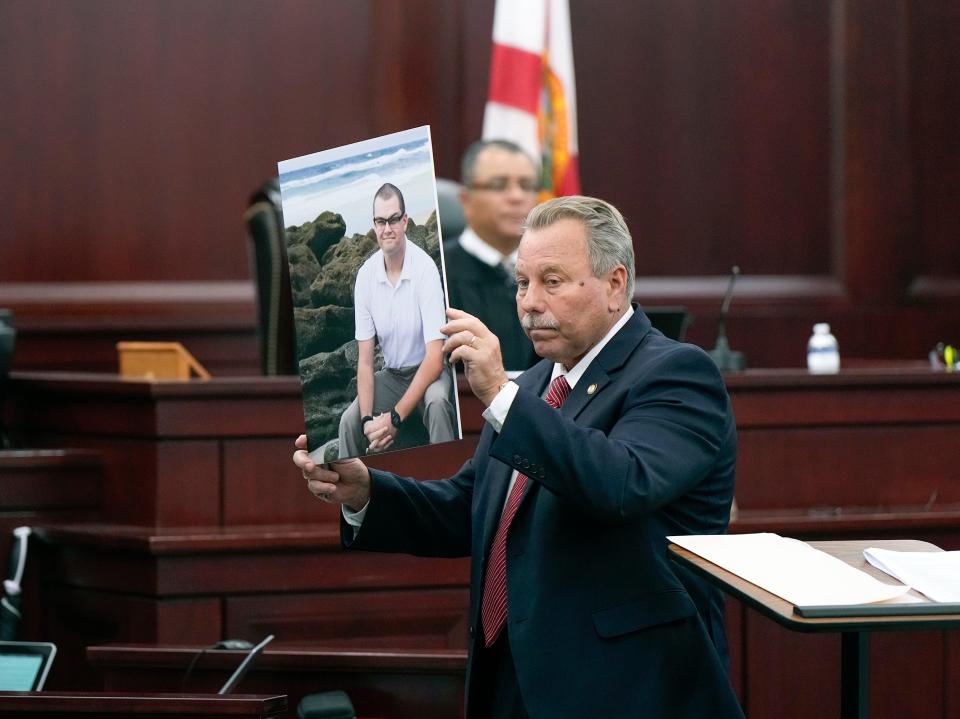Manslaughter verdict in Othal Wallace trial could be a jury compromise, attorney says

Law enforcement officials, community members and others were shocked late last week when a jury convicted an accused cop killer of manslaughter rather than first-degree murder.
But one local attorney said the verdict could have been a compromise due to some hold-out jurors, leading the panel to settle on the lesser charge to avoid a deadlocked, hung jury.
The seven women and five men deliberated for about 14 hours over two days before finding Othal Wallace guilty Saturday of manslaughter, bypassing more serious charges of first- and second-degree murder. Wallace killed Daytona Beach police officer Jason Raynor in 2021.
Aaron Delgado, a Daytona Beach criminal defense attorney not involved in the case, said based on jury questions during deliberations, it seemed jurors were concerned about the law surrounding the encounter between Wallace and Raynor.
“It may have been that they had one or two jurors who were not going to get to murder,” Delgado said in a phone interview, “were not going to get to guilty under any circumstances, because of those kinds of concerns. And so, they reached a compromise verdict of manslaughter."

Had Wallace been convicted of first-degree murder, prosecutors would have been in a courtroom this week seeking to convince eight of the 12 jurors to recommend that Wallace be sentenced to death. A new state law approved earlier this year did away with requiring a unanimous jury recommendation for death.
Had the jury found Wallace guilty of second-degree murder, he would have faced up to life in prison.
The manslaughter conviction, along with a finding that Wallace used a gun, means he faces up to 30 years in prison when he is sentenced in about two months.
While the trial was moved to Green Cove Springs in Clay County because of publicity the case had received in Volusia County, the sentencing is anticipated to take place in Volusia.
During the trial, three defense attorneys, Terry Shoemaker, Tim Pribisco and Garry Wood, faced off against Seventh Circuit State Attorney R.J. Larizza and Assistant State Attorneys Jason Lewis and Andrew Urbanak.
The defense also brought in attorney Allison Ferber Miller in August to handle its jury selection.
Delgado said in a phone interview that the only type of manslaughter that would apply in this case would be manslaughter by act, in which someone commits an intentional act that is not excusable or justifiable but results in someone’s death.
“That’s like mutual combat or like, you know, you throw someone through a window and they die,” Delgado said. He said he has had such cases in which someone punches someone and the person dies.
Wallace, 31, was charged with first-degree murder for fatally shooting Raynor on June 23, 2021, in the parking lot of an apartment building at 133 Kingston Ave., in Daytona Beach. The 26-year-old Raynor remained hospitalized until his death on Aug. 17, 2021.
Wallace’s attorneys argued that he had a right to defend himself; that it was a consensual police stop and Wallace had the right to walk away. But when he did, Raynor grabbed him.
Wallace testified he had a 9 mm pistol in his pocket and he drew it when he said he saw Raynor reaching for his waistband.
Raynor did not draw his gun or take any steps to unholster it. It was still holstered when assisting officers found him on the ground after the shooting.
Delgado said that some jurors apparently accepted the defense argument, leading to the compromise verdict.
“I would imagine that part of the reason they had to compromise was because some jurors thought that Mr. Wallace had the legal right to resist or was engaged in some sort of self-defense,” Delgado said. “Maybe it was like an imperfect self-defense where they said, ‘Well, you know, it's not self-defense to the extent that we're going to acquit him, but it's self-defense to the point where we can't get to the other types of murder that the state charged, so it definitely strikes me as some sort of jury compromise, jury pardon.”
Delgado noted that the jury asked questions about what a citizen had to do when detained by police, because the defense argued there was something improper or illegal about Raynor detaining Wallace.
“Othal Wallace was therefore engaging in some sort of self-defense because he thought that he was being unlawfully arrested or excessive or illegal force was being used against him,” Delgado said. “And so I think those questions showed that that was something that the jury was debating."

Othal Wallace faces minimum sentence of 11 1/2 years, up to 30
Delgado said according to state sentencing guidelines, the lowest possible prison term for Wallace would be 11.5 years.
He said the defense can seek a “downward departure,” meaning it would argue legal reasons why Wallace should receive a lower sentence.
But Circuit Judge Raul Zambrano is not required to grant a downward departure. Zambrano can even agree that the defense has provided reasons for a lower sentence and still sentence Wallace to the maximum of 30 years.
Jury questions offer insight into Othal Wallace verdict
Delgado also said it’s likely the defense will appeal the manslaughter conviction. If an appeal is successful, prosecutors could file a manslaughter charge against Wallace and seek to try him again on that charge. But prosecutors could not file charges of first- or second-degree murder.
Delgado said he believes any appeal would focus on the 21 pages of jury instructions given the questions jurors asked during deliberations.
One such question: At what point does an interaction with law enforcement transition from freedom to detainment? After consulting with attorneys, the judge answered, “When a reasonable person feels they are no longer free to leave.”
Another question: Can a law enforcement officer legally detain someone without telling them they are being detained and why? The answer was yes.
Jurors also asked if “it was lawful for an officer to physically restrain a citizen as a form of detainment.” The answer was that a brief involuntary detainment of a person suspected of being involved in a crime is allowed for the officer to investigate.
The defense objected to some of the responses and repeatedly requested without success that the judge allow them to provide jurors more information about the law governing encounters between police and citizens.
“The appeal will focus on the jury instructions and the defense request for specific jury instruction about the duty to submit to law enforcement and all that, which was obviously something the jury was really thinking about a lot,” Delgado suggested. “You heard the defense renew their request for that jury instruction a bunch of times.”
Verdicts must be respected
Craig Trocino, a law professor at the University of Miami and director of Miami Law's Innocence Clinic, said jury verdicts are "unique slices of time." He said 12 different jurors could decide a different outcome.
Trocino said he was not commenting on whether the jury was right or wrong, but rather on the jury system in general.
"And even though somebody might not like the verdict, we have to abide by the verdict, because it is difficult to convict somebody, and it's difficult to convict somebody of a capital offense. And it potentially sends them to death," Trocino said. "And that's a feature, not a bug. It ought to be difficult.
"It's the jury's verdict," Trocino said. "And if there's going to be any longstanding belief in our justice system, we have to – under all circumstances – abide by the jury's decision."
This article originally appeared on The Daytona Beach News-Journal: Jason Raynor shooting verdict could be jury compromise, attorney says

